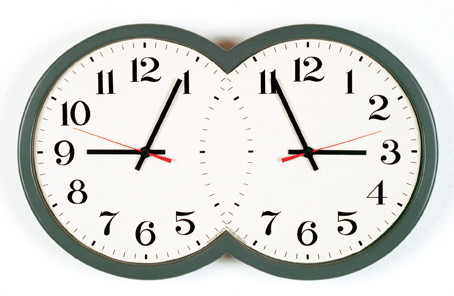Esther Shalev-Gerz
09 Feb - 06 Jun 2010

Esther Shalev-Gerz
Anges inséparables 10
de l’installation Anges inséparables. La maison éphémère pour Walter Benjamin (Inseparable Angels. The Imaginary House of Walter Benjamin), 2000
Double horloge, 32 x 60 x 5 cm
Courtesy de l’artiste
© Esther Shalev-Gerz, ADAGP, Paris 2009
Anges inséparables 10
de l’installation Anges inséparables. La maison éphémère pour Walter Benjamin (Inseparable Angels. The Imaginary House of Walter Benjamin), 2000
Double horloge, 32 x 60 x 5 cm
Courtesy de l’artiste
© Esther Shalev-Gerz, ADAGP, Paris 2009
ESTHER SHALEV-GERZ
9 February 2010 - 6 June 2010
Over three decades Esther Shalev-Gerz has consistently performed a process of unravelling particularities in order to reflect on the ways in which the generalities of history and memory are constructed. Working with a specific place, a certain moment in history, an urgent question, or a shared experience that resonates through history, Shalev-Gerz mines the personal in order to address and interrogate the ways in which the present is understood. Drawing on the fictions of history and speculations on the future, she amplifies the ethics of being invited to speak and being invited to listen. Hers is a powerful artistic practice that complicates how we understand our place in the world.
Shalev-Gerz’s survey exhibition at Jeu de Paume presents an exchange of ideas constructed through acts and encounters of communication. This gathering of works interrogates assumptions and opens the space between understanding and perception, embracing doubt and reframing what operates as a ‘given’ within a particular moment. This is an artistic practice making material the reciprocal relationship between remembering and forgetting, investigating how this affects both the perception of historical experience and the production of historical narrative. Shalev-Gerz’s works operate as paradoxical and incomplete entities that mutate in response to their conditions of display and to how they sit in relation to the world as the slow pace of historical change impacts on conduct and attitudes.
Here at Jeu de Paume this is emphasised as each work is reconfigured through its relationship to others: just like the operations of memory this is a looping non-chronological process. These photographs, objects and videos are grounded in an aesthetics that reflects acts of seeing, pointing to the beauty in the details of everyday perception. With an intense attention to the visual, they use the image to go beyond language in order to communicate the complexities of perception. These works offer not a reflected image of the world, rather one that contests what we think we know. This is not artistic practice that imitates or performs the world, it is of the world: interacting with each work is an experience of immediacy and present-ness. (...)
Lisa Le Feuvre,
"Nothing is written. We all know that. Don’t we".
Extract from the catalogue of the exhibition.
Curator: Marta Gili
9 February 2010 - 6 June 2010
Over three decades Esther Shalev-Gerz has consistently performed a process of unravelling particularities in order to reflect on the ways in which the generalities of history and memory are constructed. Working with a specific place, a certain moment in history, an urgent question, or a shared experience that resonates through history, Shalev-Gerz mines the personal in order to address and interrogate the ways in which the present is understood. Drawing on the fictions of history and speculations on the future, she amplifies the ethics of being invited to speak and being invited to listen. Hers is a powerful artistic practice that complicates how we understand our place in the world.
Shalev-Gerz’s survey exhibition at Jeu de Paume presents an exchange of ideas constructed through acts and encounters of communication. This gathering of works interrogates assumptions and opens the space between understanding and perception, embracing doubt and reframing what operates as a ‘given’ within a particular moment. This is an artistic practice making material the reciprocal relationship between remembering and forgetting, investigating how this affects both the perception of historical experience and the production of historical narrative. Shalev-Gerz’s works operate as paradoxical and incomplete entities that mutate in response to their conditions of display and to how they sit in relation to the world as the slow pace of historical change impacts on conduct and attitudes.
Here at Jeu de Paume this is emphasised as each work is reconfigured through its relationship to others: just like the operations of memory this is a looping non-chronological process. These photographs, objects and videos are grounded in an aesthetics that reflects acts of seeing, pointing to the beauty in the details of everyday perception. With an intense attention to the visual, they use the image to go beyond language in order to communicate the complexities of perception. These works offer not a reflected image of the world, rather one that contests what we think we know. This is not artistic practice that imitates or performs the world, it is of the world: interacting with each work is an experience of immediacy and present-ness. (...)
Lisa Le Feuvre,
"Nothing is written. We all know that. Don’t we".
Extract from the catalogue of the exhibition.
Curator: Marta Gili
